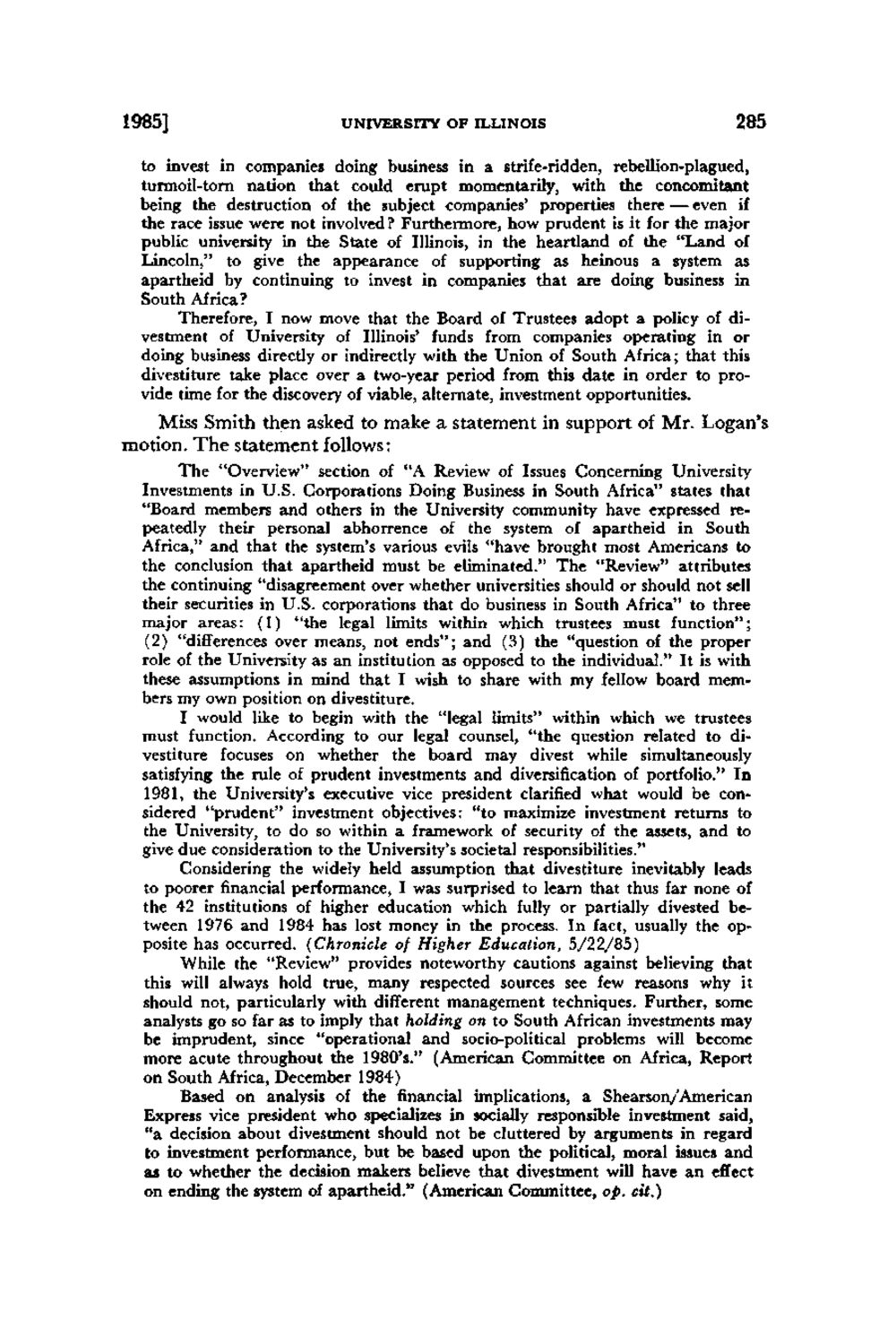| |
| |
Caption: Board of Trustees Minutes - 1986
This is a reduced-resolution page image for fast online browsing.

EXTRACTED TEXT FROM PAGE:
1985] UNIVERSITY OF ILLINOIS 285 to invest in companies doing business in a strife-ridden, rebellion-plagued, turmoil-torn nation that could erupt momentarily, with the concomitant being the destruction of the subject companies' properties there — even if the race issue were not involved ? Furthermore, how prudent is it for the major public university in the State of Illinois, in the heartland of the "Land of Lincoln," to give the appearance of supporting as heinous a system as apartheid by continuing to invest in companies that are doing business in South Africa? Therefore, I now move that the Board of Trustees adopt a policy of divestment of University of Illinois' funds from companies operating in or doing business directly or indirectly with the Union of South Africa; that this divestiture take place over a two-year period from this date in order to provide time for the discovery of viable, alternate, investment opportunities. Miss S m i t h t h e n a s k e d t o m a k e a s t a t e m e n t in s u p p o r t of M r . L o g a n ' s m o t i o n . T h e s t a t e m e n t follows: The "Overview" section of "A Review of Issues Concerning University Investments in U.S. Corporations Doing Business in South Africa" states that "Board members and others in the University community have expressed repeatedly their personal abhorrence of the system of apartheid in South Africa," and that the system's various evils "have brought most Americans to the conclusion that apartheid must be eliminated." The "Review" attributes the continuing "disagreement over whether universities should or should not sell their securities in U.S. corporations that do business in South Africa" to three major areas: (1) "the legal limits within which trustees must function"; (2) "differences over means, not ends"; and (3) the "question of the proper role of the University as an institulion as opposed to the individual." It is with these assumptions in mind that I wish to share with my fellow board members my own position on divestiture. I would like to begin with the "legal limits" within which we trustees must function. According to our legal counsel, "the question related to divestiture focuses on whether the board may divest while simultaneously satisfying the rule of prudent investments and diversification of portfolio." In 1981, the University's executive vice president clarified what would be considered "prudent" investment objectives: "to maximize investment returns to the University, to do so within a framework of security of the assets, and to give due consideration to the University's societal responsibilities." Considering the widely held assumption that divestiture inevitably leads to poorer financial performance, I was surprised to learn that thus far none of the 42 institutions of higher education which fully or partially divested between 1976 and 1984 has lost money in the process. In fact, usually the opposite has occurred. (Chronicle of Higher Education, 5/22/85) While the "Review" provides noteworthy cautions against believing that this will always hold true, many respected sources see few reasons why it should not, particularly with different management techniques. Further, some analysts go so far as to imply that holding on to South African investments may be imprudent, since "operational and socio-political problems will become more acute throughout the 1980's." (American Committee on Africa, Report on South Africa, December 1984) Based on analysis of the financial implications, a Shearson/American Express vice president who specializes in socially responsible investment said, "a decision about divestment should not be cluttered by arguments in regard to investment performance, but be based upon the political, moral issues and as to whether the decision makers believe that divestment will have an effect on ending the system of apartheid." (American Committee, op. cit.)
| |